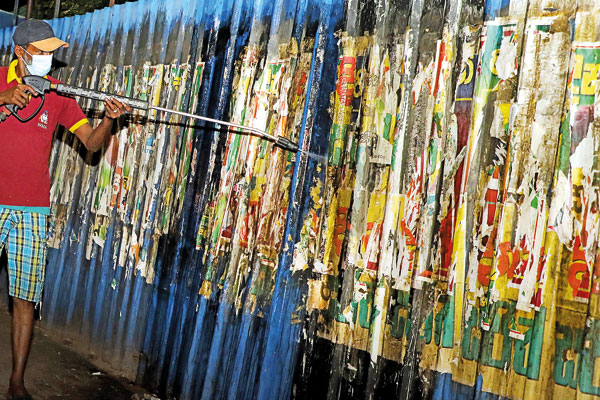News
Municipal Councils, police all set to remove poll publicity materials that fall foul of the law
View(s):By Nathara Abeywickrema
Election publicity material displayed in public without permission are being removed by the Colombo Municipal Council (CMC) and police to comply with the law.
The CMC has warned of legal action against any candidate or political party which decorates roads, streets, or public places for any election-related propaganda without permission, or without paying fees.

High-pressure water hose being used to remove posters and below, posters being removed by hand. Pix by Nilan Maligaspe
According to Municipal Commissioner Bhadranie Jayawardhana, the CMC has written to general secretaries of over 80 political parties recognised by the Election Commission (EC). The parties were reminded to comply with the presidential election laws, particularly concerning the use of propaganda materials. Ms. Jayawardhana said that any candidate or political party intending to decorate the city must get permission from the council, if not, the materials will be removed and legal action will be pursued.
The CMC has formed an operations committee led by the deputy municipal services commissioner of engineering, to manage this task.
According to the EC, political parties are only allowed to decorate their designated party offices and rally sites. The removal of unauthorised election-related posters and banners has been outsourced to two private companies. One company uses high-pressure water hoses, according to an official.
Police Media Spokesman DIG Ruwan Gunasekera outlining the legal framework under the Presidential Election Act said that while the law prohibits any promotional materials from August 15 to September 22, exceptions are allowed for small flags on personal vehicles. Banners and posters can be displayed on the premises of registered election offices, as well as during meetings and rallies, but only within the premises.
Posters for meetings, or rallies, can include the event’s symbol, date, and venue, and must be displayed within a reasonable period before the event.
The police began enforcing these regulations on August 15, with operations to remove illegal postings from August 17.
To date, about 80,000 cutouts and banners have been removed by 1,500 workers across the island. Polythene and plastic materials are not allowed.

Candidates are allowed to open one notified central election office in each of the 22 electoral districts, one notified branch office in each polling division and place of residence of any candidate or his authorised agent as an election office, said DIG Gunasekera referring to the Act.
Each office must adhere to regulations set by the EC. Regulations cover aspects such as the display of election materials, the use of public spaces, and other campaign-related activities.
Manjula Gajanayake, executive director of the Institute for Democratic Reforms & Electoral Studies said there has not been any violence so far.
The public, especially the youth, have become more aware and less biased. The number of posters being put up is significantly lower compared with past elections, where the practice often led to clashes during late night and early morning hours when posters were typically pasted, he said.
This decline in poster use can be attributed to several factors.
Many politicians now rely on digital campaigns. The existing campaign finance laws have also constrained candidates, with some running only to support a main candidate or uplift their own status. Additionally, the drop in poster and banner placements is partly due to some parties losing power and members, with many defecting to support other main candidates.
The EC has allocated Rs 600 million for removing illegal campaign materials, managing administration, and for paying drivers and workers.
People’s Action for Free & Fair Elections (PAFFREL) executive director Rohana Hettiarachchi, said that, there is a law requiring the removal of posters, banners, cutouts, and similar items 48 hours before election day. The final day is midnight of September 18.
Displaying a candidate’s symbol or image is illegal, although images are seen on vehicles, including three-wheelers. The only exception is that a candidate may display his symbol on a flag on the personal vehicle. Hoardings and posters are permitted at rallies.
When inviting people to rallies, parties can put up posters showing the date, time, and party symbol, but not the candidate’s image. Additionally, police permission is needed for digital boards and loudspeakers.
Considering these factors, Professor Arjuna Parakrama, chief operating officer of the Centre for Monitoring Election Violations, said that excessive spending on posters and banners leads to increased aggression and is a waste of money.
Municipal Commissioner of Kandy, Indika Abeysinghe, said displaying election campaign materials is prohibited, and any such materials will be removed by the inspection unit. If anyone wishes to display campaign materials, they must make a payment, but even then, they are only permitted to do so in designated areas.
Municipal Commissioner of Galle, R.M.T.K. Rathnayake, noted that there are significantly fewer posters and billboards compared with previous elections. Illegal posters are being removed.
Niroshani Gunadasa, municipal commissioner of Polonnaruwa, said the district election complaint units handle the removal of posters. She noted that there have been only few posters in Polonnaruwa.
Ruwan Wijesinghe, municipal commissioner of Anuradhapura, said posters of the main candidates are seen in public areas. Any unauthorised posters will be removed once the EC releases funds for worker wages.
The best way to say that you found the home of your dreams is by finding it on Hitad.lk. We have listings for apartments for sale or rent in Sri Lanka, no matter what locale you're looking for! Whether you live in Colombo, Galle, Kandy, Matara, Jaffna and more - we've got them all!

